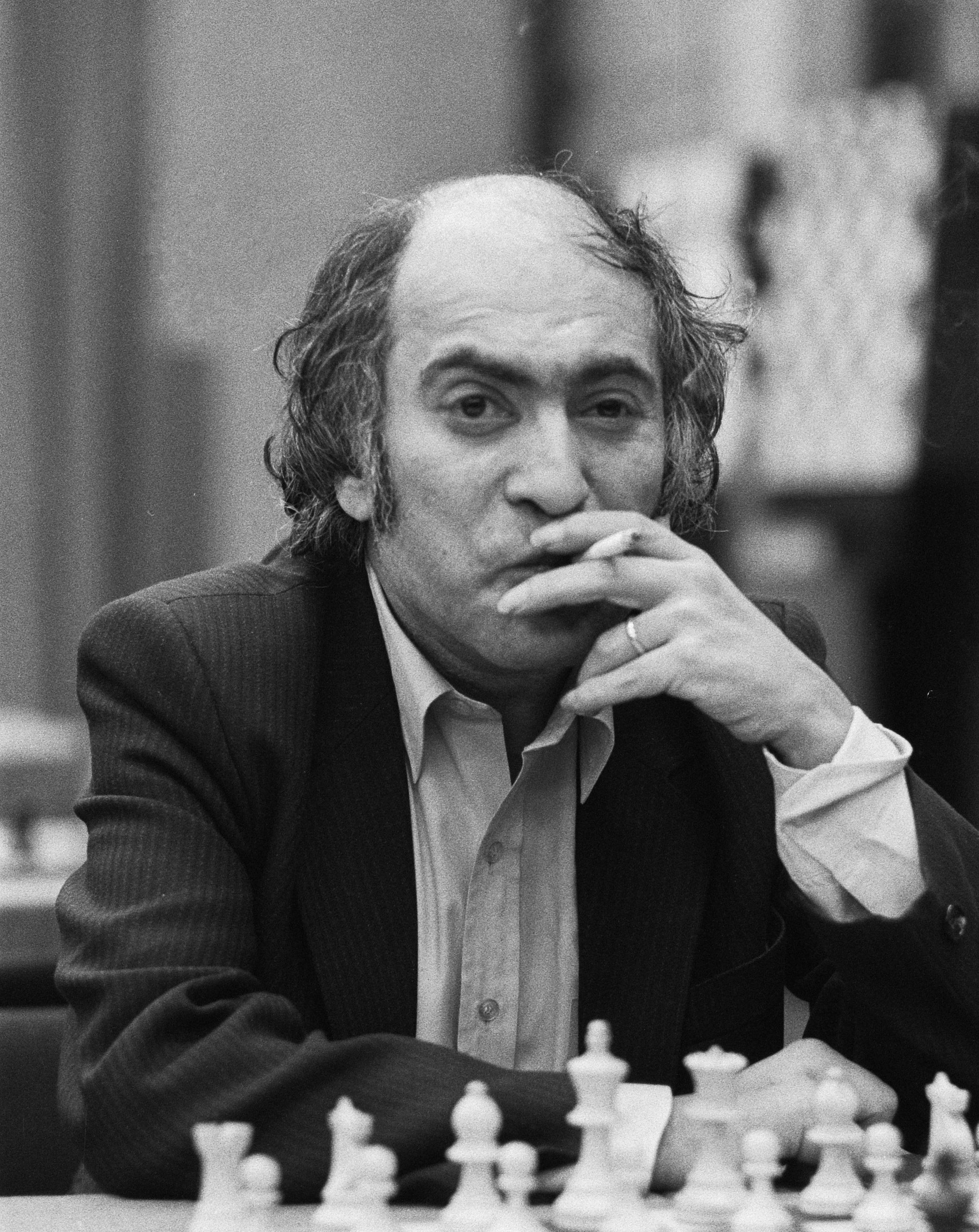
Amateur vs. World Champion
Once upon a time, Alexander Roshal, who was the chief editor of the famous Soviet weekly "64," called Mikhail Tal and asked for some original material for his publication.
Tal answered that he would be happy to help his old friend and told Roshal the following story.

Tal via Wikipedia
Soon after Tal won the match vs. Mikhail Botvinnik and became the world champion, a friend of his asked for a favor. The friend was a doctor in a psychiatric hospital and had an unusual patient. The doctor had seen many patients who pretended to be Napoleon, Beethoven or another historical figure, but this new patient was telling everyone that he was the world chess champion.
Since the doctor couldn't play chess, he asked Tal to come pretending to be just a regular chess player to beat the guy and therefore prove that the patient was delusional. Tal promised to help and some time later he paid a visit to the doctor. The doctor introduced Tal as his friend who likes to play chess and asked the patient if he was willing to play a game or two against Tal. And so the game started.
While they played the game Tal and the doctor kept chatting so the patient wouldn't see any hidden agenda in their game. Suddenly, the patient sacrificed a piece and started an attack. To his horror, Tal realized that he was losing. He stopped talking and tried all the tricks he could find, but the mental patient ruthlessly finished his attack and won the game!
The second game was played in complete silence because neither Tal nor the doctor could say a word! Tal admitted that he played the second game with better concentration than some of the games in his match vs. Botvinnik. Despite the stubborn defense, at the end the patient had to resign. He was visibly upset,refused to play a third game and asked to let him back to his room.
A couple of weeks later the doctor called Tal, thanked him for his help and said that the patient is getting better. He no longer thought that he is the world champion and refused even to talk about chess. Later he was released from the mental hospital and never played chess again.
Roshal liked the story a lot and promptly published it in the next issue of "64." The readers' response was overwhelming, and soon Roshal called Tal again.
"Misha, everyone is dying to know what happened to the guy, what was his name, where did he learn to play chess?" asked Roshal.
"What guy?" — Tal didn't understand what Roshal was talking about.
"Well, the guy from the mental hospital, where you played him," clarified Roshal.
"Oh, that guy...Well, you have to forgive me, but I made up the whole story from the beginning to end," laughed Tal!

This story is similar to some extent to "The Royal Game," by Stefan Zweig. Can it happen in real life? I doubt it, but something similar almost happened to me. At that point I was drafted to the Soviet army and was about to participate in the world junior championship. I already told the whole story here. What I didn't mention in that story is that at some point I needed to get civilian clothing, since I didn't want to scare peaceful Australians with my Soviet army uniform. ![]()
The guy who was in charge of "каптёрка" (stock of our army and civilian clothing) was a nice fellow about my age. He said, "of course I'll give you your civilian clothing if you beat me in chess".
I took his words as a nice joke and we sat to play chess. We talked about typical subjects, until I realized that the position on the board was quite drawish and he might be not joking when he said "if you beat me"!
Of course I don't remember the exact position, but the endgame looked something like this:
At first I panicked, but then comforted myself, thinking, "come on, you are almost an international master and you are playing just an average amateur. Besides Fischer proved in many games that a bishop should be stronger than a knight in such a position."
I don't remember the rest of the game, but I managed to win it. I have a good excuse: I wasn't the world champion.
But did it happen in the real life that the world champion lost to an amateur. Of course it depends how you describe an "amateur." If I remember correctly, GM Luke McShane called himself "an amateur player" when his rating was already close to FIDE 2700! Technically the statement was correct since McShane worked as a trader in London's stock exchange. But, how can you call a FIDE 2700 grandmaster an amateur?
Yes, there are many strong chess players who don't play chess professionally, including our favorite doctor. So, let's call an amateur a chess player who has no rating or whose rating is no higher than 2200.
I guess it would be a proper way to start our little collection with the game that Tal lost immediately after becoming the world champion.
While Barstatis was a Soviet master (and therefore I am not sure if we can really call him an amateur), Botvinnik's opponent in the next game is a true amateur, since I couldn't find any other game played by this guy.
Most of the time, upsets like this happen when the world champions underestimate their weaker opponents. For instance, Botvinnik in the game above played "coffeehouse chess" in the opening, which was not very typical of him. And in the following game Boris Spassky simply blundered a piece as early as move nine!
To be fair, sometimes upsets like these happen when an amateur plays very good chess, like in the following game:
What are you favorite games where an amateur beat the world champion?



